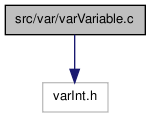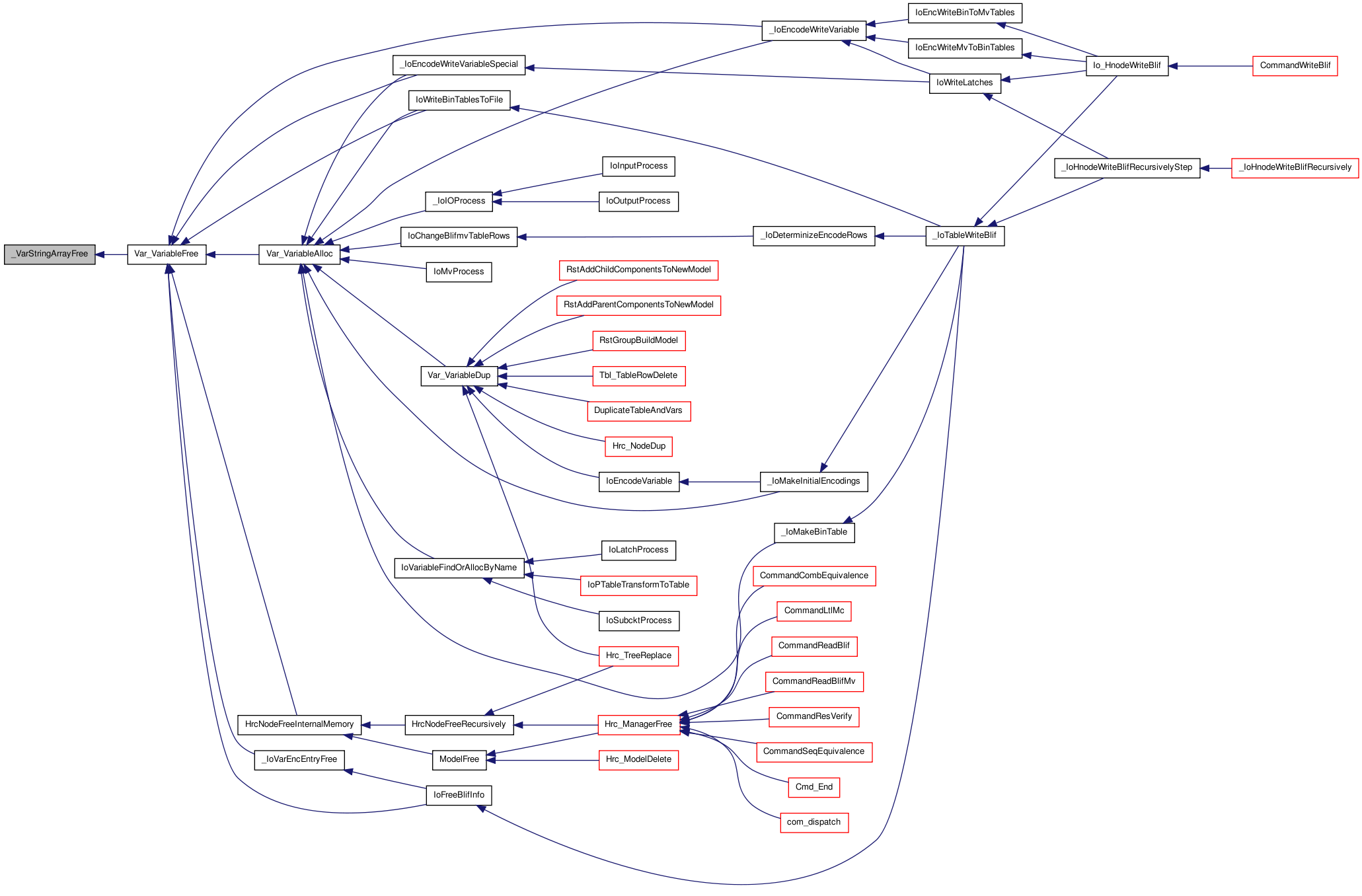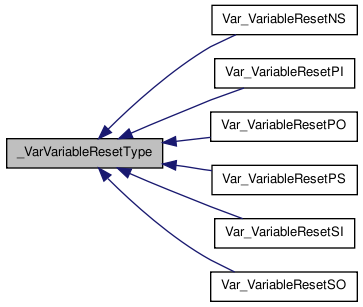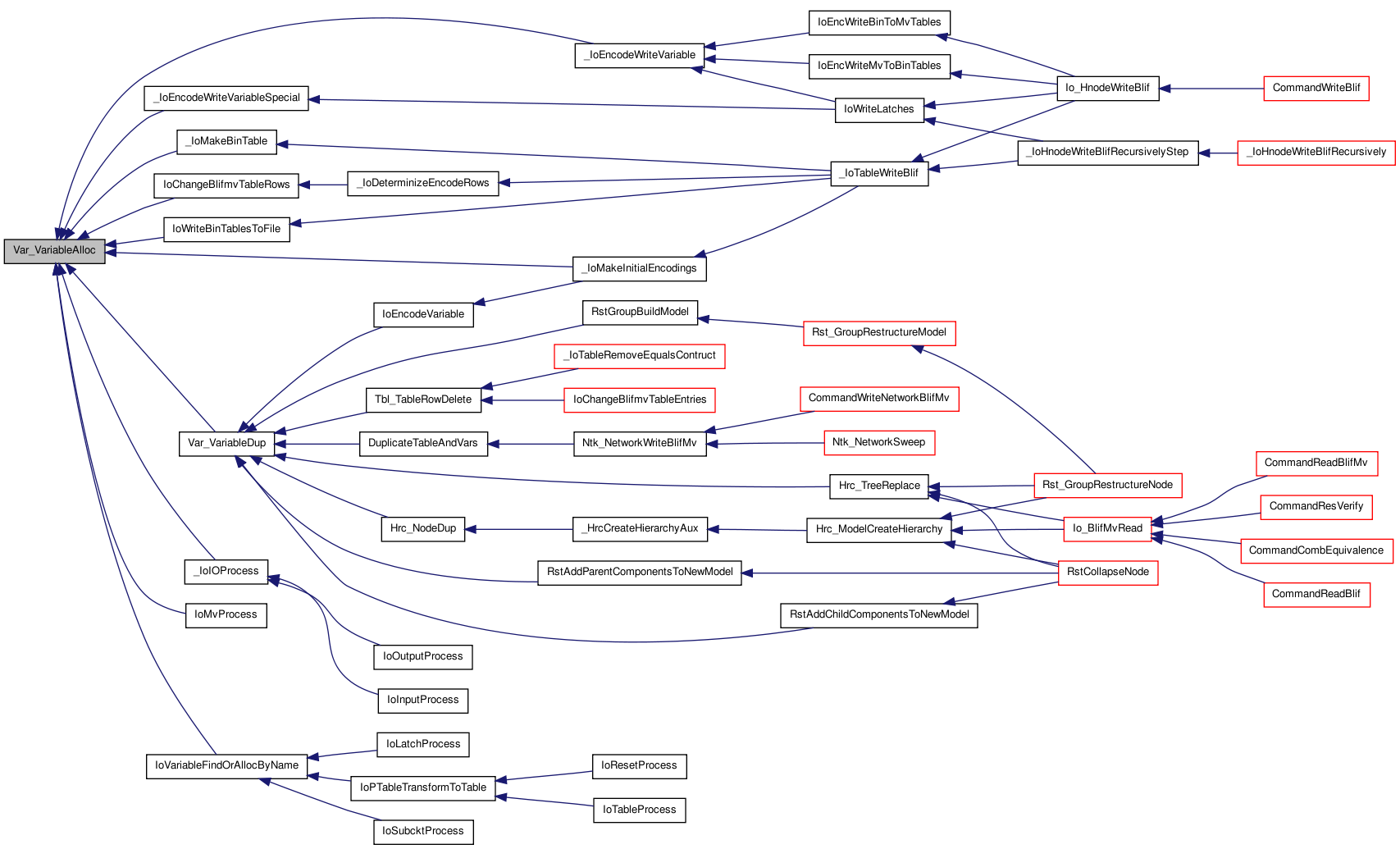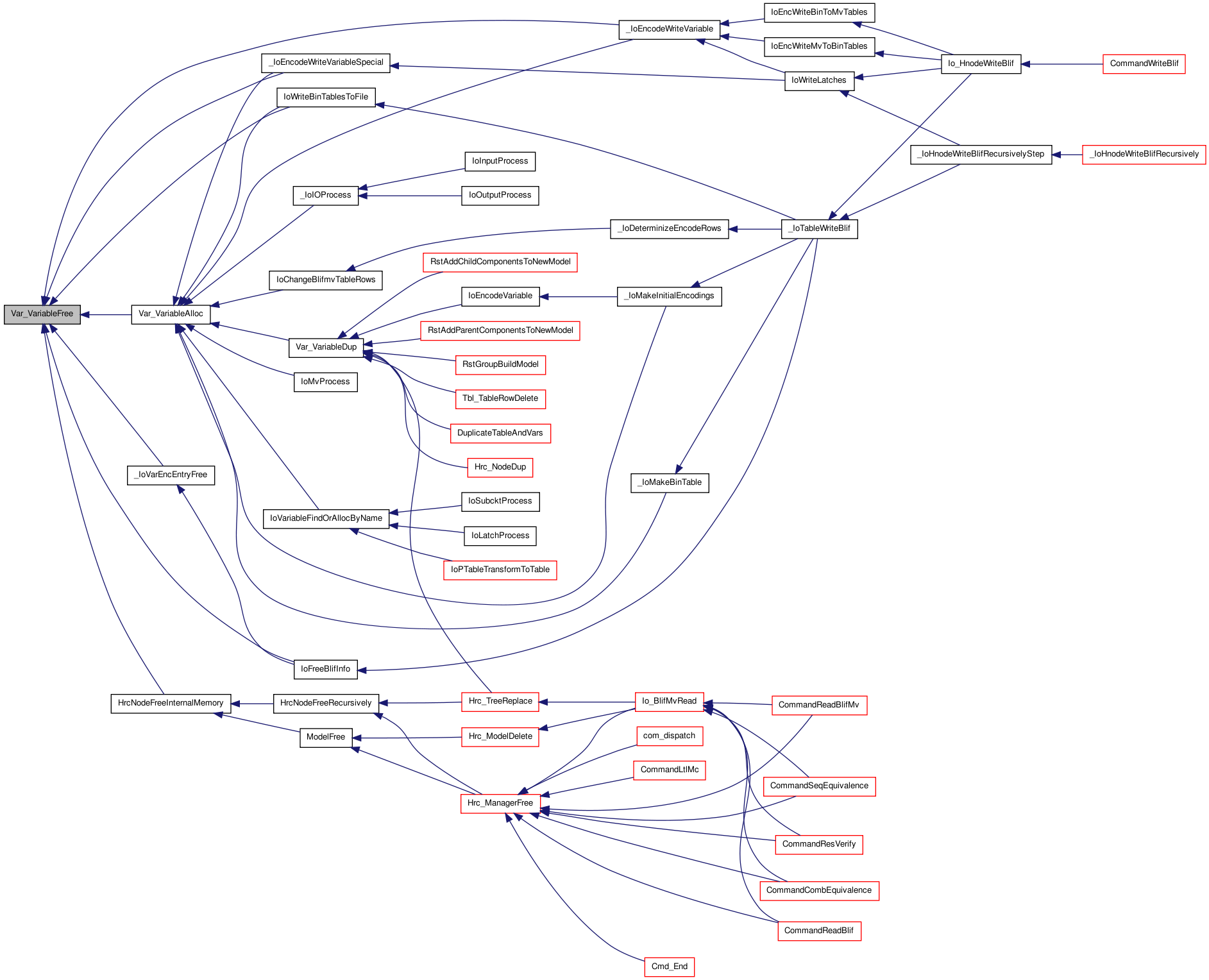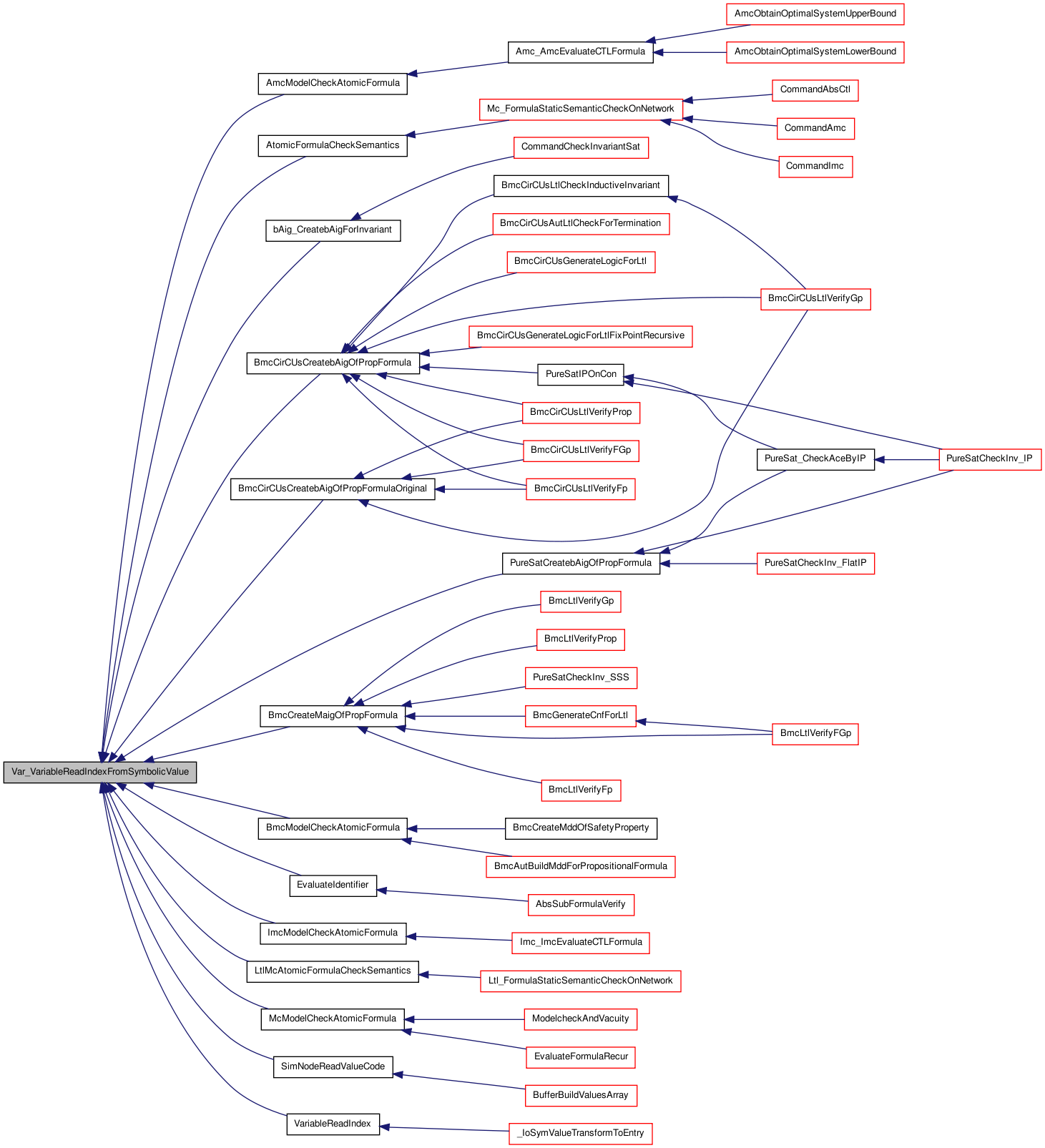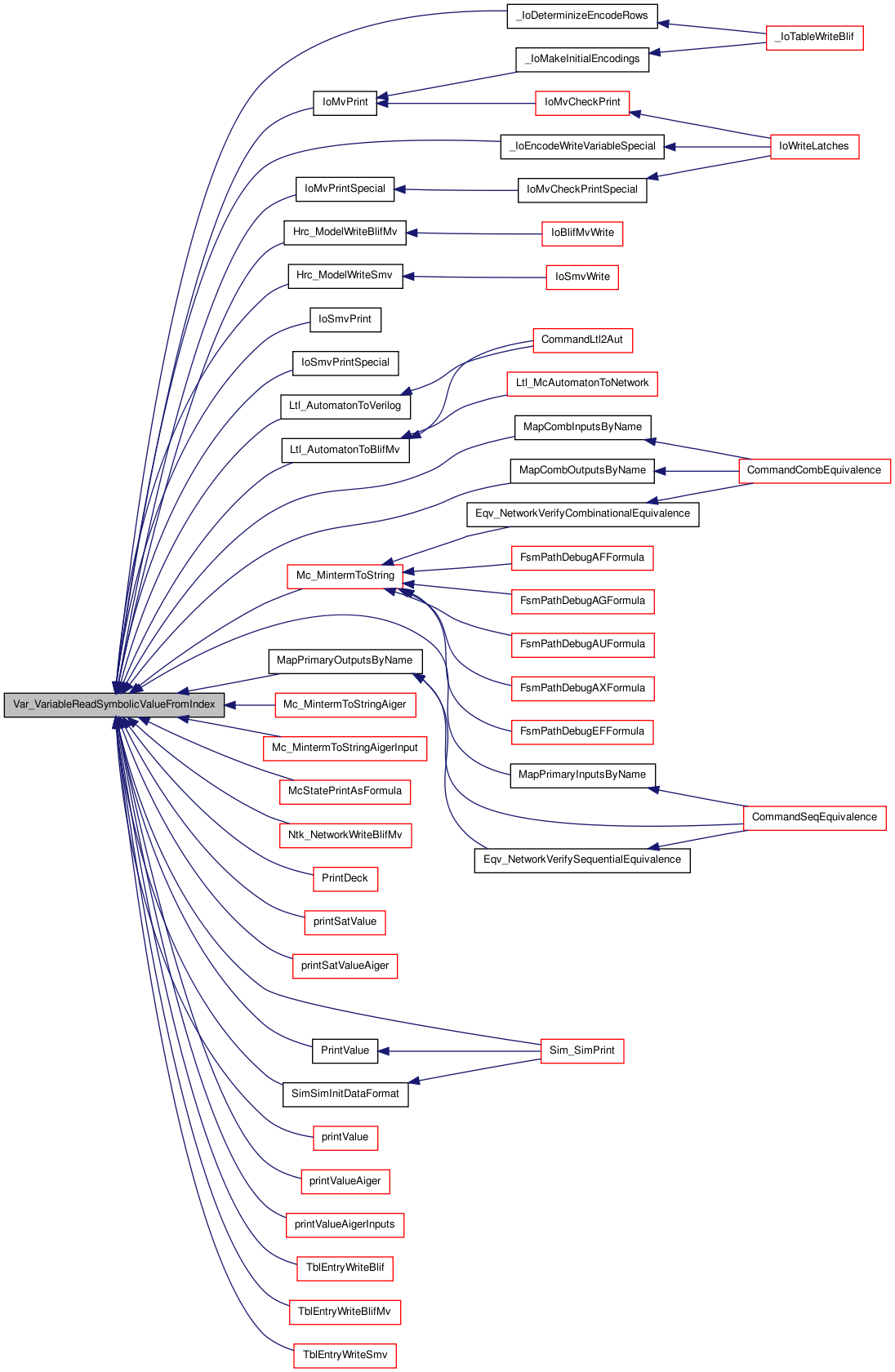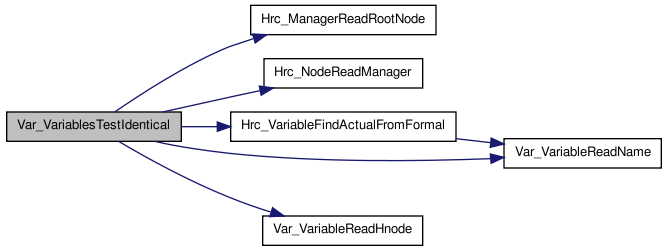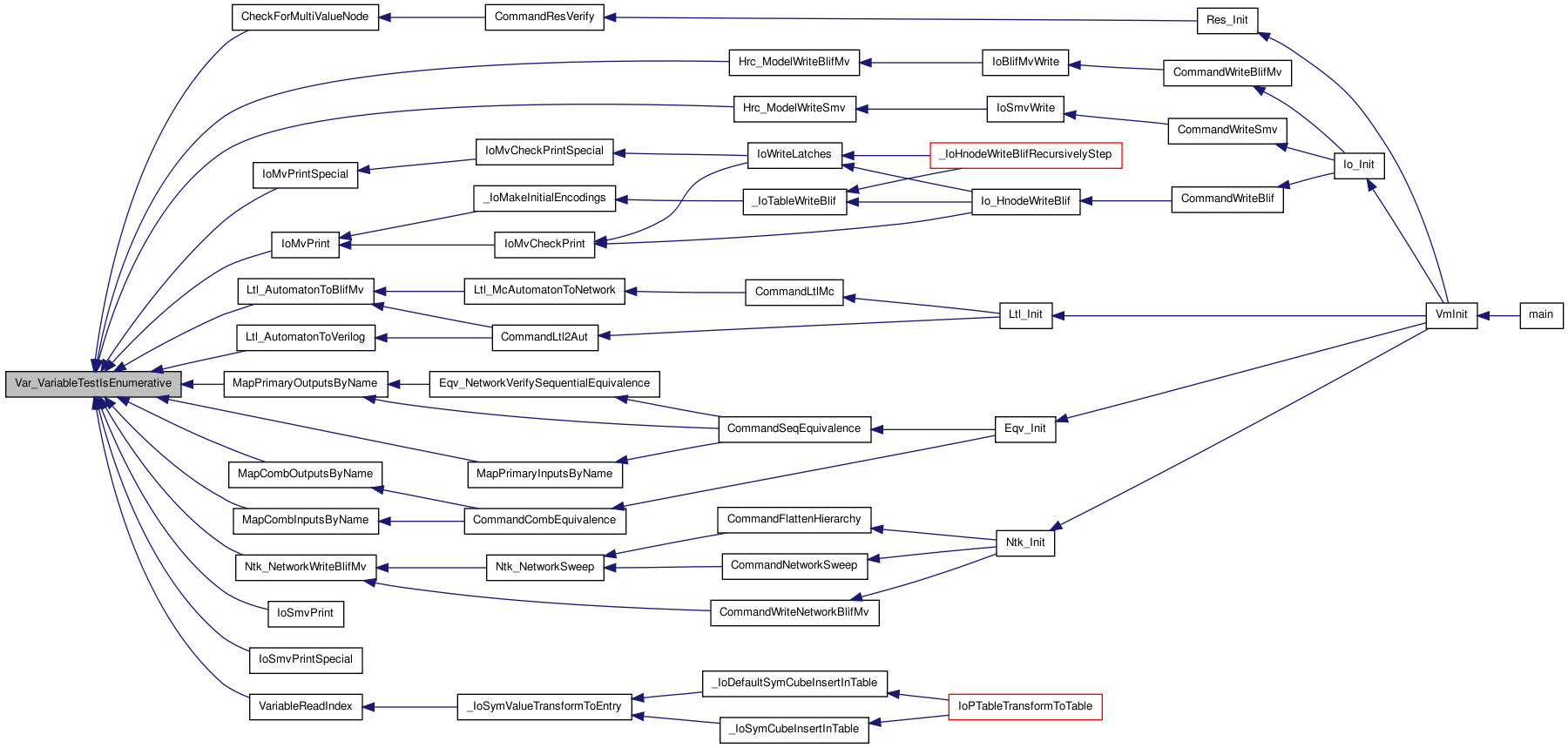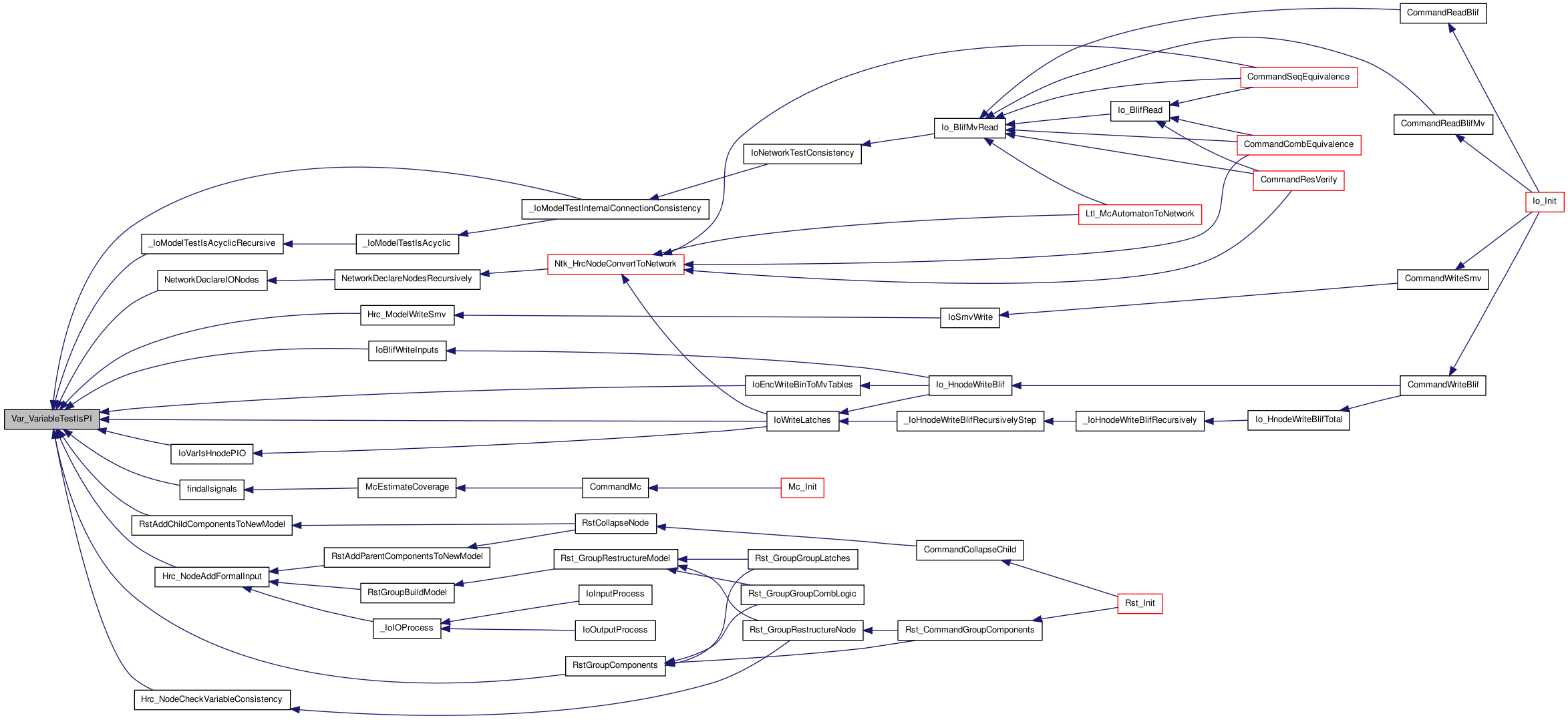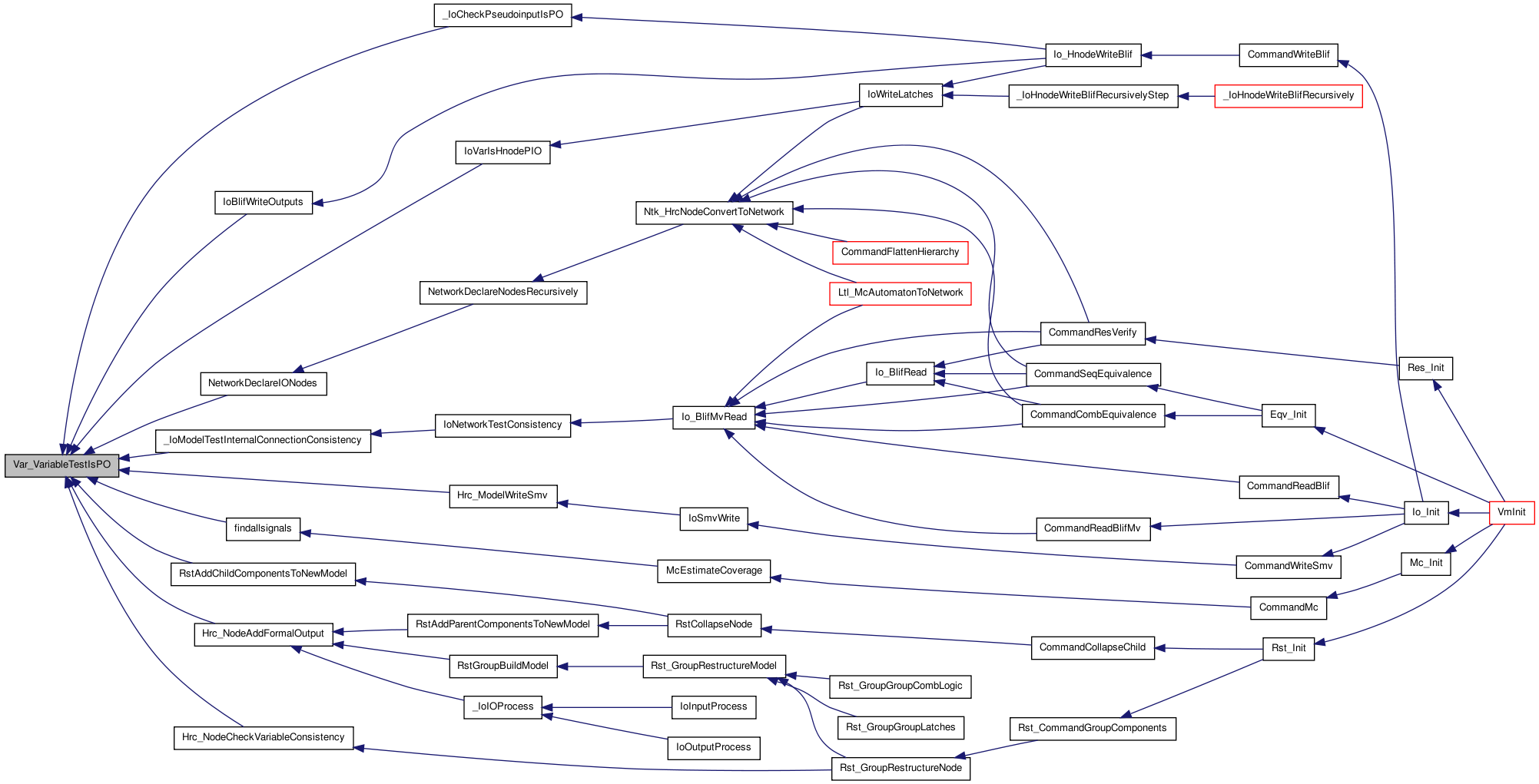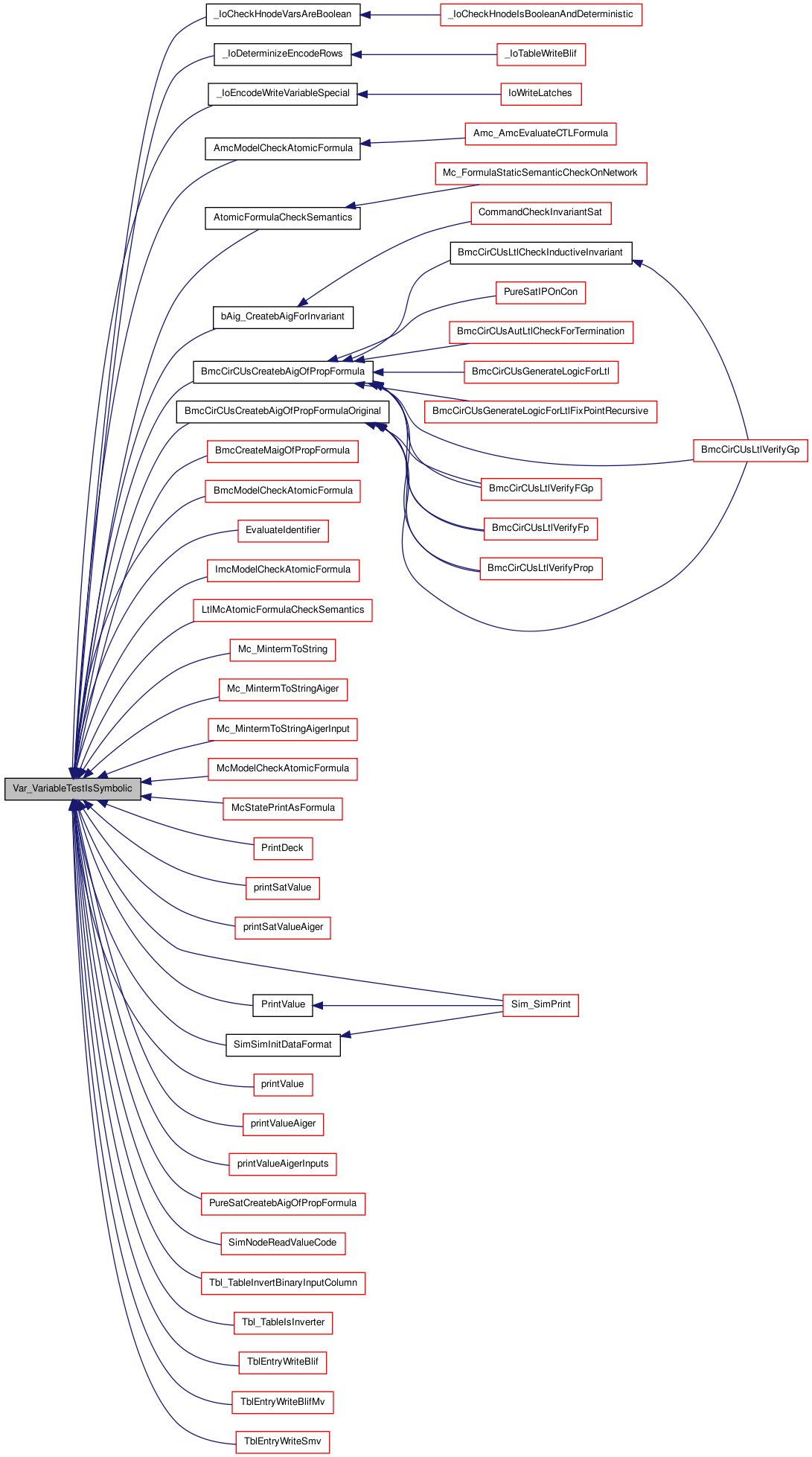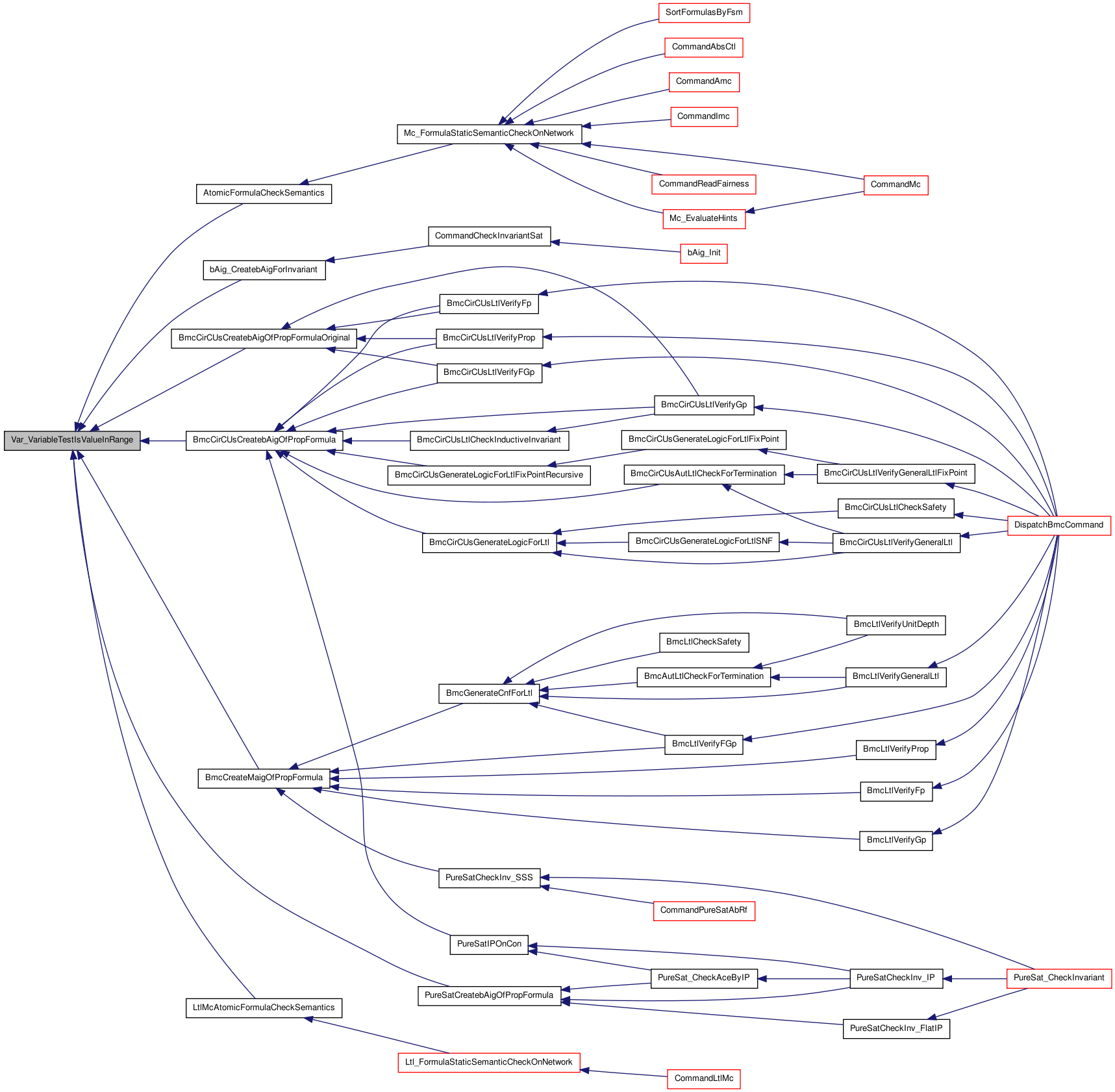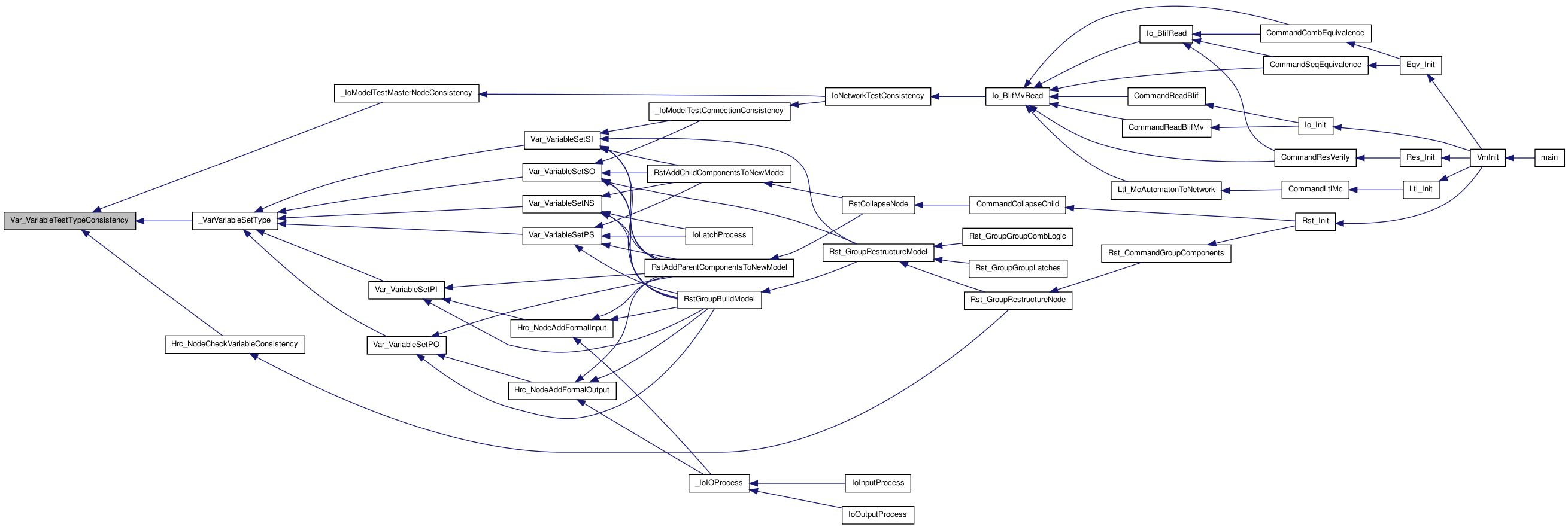#include "varInt.h" Include dependency graph for varVariable.c:
Include dependency graph for varVariable.c:Go to the source code of this file.
Functions | |
| static int | _VarVariableSetType (Var_Variable_t *var, int type) |
| static int | _VarVariableResetType (Var_Variable_t *var, int type) |
| static char * | _VarTypeDecode (int type) |
| static array_t * | _VarStringArrayDup (array_t *array) |
| static void | _VarStringArrayFree (array_t *array) |
| boolean | Var_VariableAddRangeInfo (Var_Variable_t *var, int numValues, array_t *symValArray) |
| boolean | Var_VariableExpandRange (Var_Variable_t *var, int numValues) |
| boolean | Var_VariableReduceRange (Var_Variable_t *var, int numValues) |
| Var_Variable_t * | Var_VariableAlloc (Hrc_Node_t *hnode, char *name) |
| void | Var_VariableFree (Var_Variable_t *var) |
| Var_Variable_t * | Var_VariableDup (Var_Variable_t *var, Hrc_Node_t *hnode) |
| char * | Var_VariableReadName (Var_Variable_t *var) |
| boolean | Var_VariableTestIsPI (Var_Variable_t *var) |
| boolean | Var_VariableTestIsPO (Var_Variable_t *var) |
| boolean | Var_VariableTestIsPS (Var_Variable_t *var) |
| boolean | Var_VariableTestIsNS (Var_Variable_t *var) |
| boolean | Var_VariableTestIsSI (Var_Variable_t *var) |
| boolean | Var_VariableTestIsSO (Var_Variable_t *var) |
| boolean | Var_VariableTestIsSymbolic (Var_Variable_t *var) |
| boolean | Var_VariableTestIsEnumerative (Var_Variable_t *var) |
| boolean | Var_VariableTestIsValueInRange (Var_Variable_t *var, int value) |
| int | Var_VariableReadNumValues (Var_Variable_t *var) |
| int | Var_VariableReadNumFanoutTables (Var_Variable_t *var) |
| void | Var_VariableIncrementNumFanoutTables (Var_Variable_t *var) |
| void | Var_VariableResetNumFanoutTables (Var_Variable_t *var) |
| char * | Var_VariableReadSymbolicValueFromIndex (Var_Variable_t *var, int i) |
| int | Var_VariableReadIndexFromSymbolicValue (Var_Variable_t *var, char *symbolicValue) |
| Hrc_Node_t * | Var_VariableReadHnode (Var_Variable_t *var) |
| char * | Var_VariableReadTypeIdentifier (Var_Variable_t *var) |
| void * | Var_VariableReadUndef (Var_Variable_t *var) |
| boolean | Var_VariableChangeName (Var_Variable_t *var, char *name) |
| int | Var_VariableSetPI (Var_Variable_t *var) |
| int | Var_VariableSetPO (Var_Variable_t *var) |
| int | Var_VariableSetPS (Var_Variable_t *var) |
| int | Var_VariableSetNS (Var_Variable_t *var) |
| int | Var_VariableSetSI (Var_Variable_t *var) |
| int | Var_VariableSetSO (Var_Variable_t *var) |
| int | Var_VariableResetPI (Var_Variable_t *var) |
| int | Var_VariableResetPO (Var_Variable_t *var) |
| int | Var_VariableResetPS (Var_Variable_t *var) |
| int | Var_VariableResetNS (Var_Variable_t *var) |
| int | Var_VariableResetSI (Var_Variable_t *var) |
| int | Var_VariableResetSO (Var_Variable_t *var) |
| void | Var_VariableResetAllTypes (Var_Variable_t *var) |
| void | Var_VariableSetTypeIdentifier (Var_Variable_t *var, char *typeIdentifier) |
| boolean | Var_VariablesTestIdentical (Var_Variable_t *var1, Var_Variable_t *var2) |
| boolean | Var_VariablesTestHaveSameDomain (Var_Variable_t *var1, Var_Variable_t *var2) |
| boolean | Var_VariableTestTypeConsistency (Var_Variable_t *var) |
| boolean | Var_VariablesTestHaveSameTypeIdentifier (Var_Variable_t *var1, Var_Variable_t *var2) |
Variables | |
| static char rcsid[] | UNUSED = "$Id: varVariable.c,v 1.6 2009/01/18 01:58:09 fabio Exp $" |
Function Documentation
| static array_t * _VarStringArrayDup | ( | array_t * | array | ) | [static] |
Function********************************************************************
Synopsis [Duplicates an array of strings.]
Description [Duplicates an array of strings. Strings themselves are also copied over to the new array.]
SideEffects []
SeeAlso []
Definition at line 1306 of file varVariable.c.
{
int i;
char *symbol,*newSymbol;
array_t *newArray;
newArray = array_alloc(char *,0);
for (i=0; i < array_n(array); i++) {
symbol = array_fetch(char *, array, i);
newSymbol = util_strsav(symbol);
array_insert_last(char *,newArray,newSymbol);
}
return newArray;
}
 Here is the caller graph for this function:
Here is the caller graph for this function:| static void _VarStringArrayFree | ( | array_t * | array | ) | [static] |
Function********************************************************************
Synopsis [Frees an array of strings.]
Description [Frees an array of strings. Strings themselves are also freed.]
SideEffects []
SeeAlso []
Definition at line 1334 of file varVariable.c.
{
int i;
char *symbol;
for (i=0; i < array_n(array); i++) {
symbol = array_fetch(char *, array, i);
FREE(symbol);
}
array_free(array);
}
 Here is the caller graph for this function:
Here is the caller graph for this function:| static char * _VarTypeDecode | ( | int | type | ) | [static] |
Function********************************************************************
Synopsis [Returns the character string corresponding to a type encoded in an integer. Note that SI and SO are filtered out.]
Description []
SideEffects []
SeeAlso []
Definition at line 1244 of file varVariable.c.
{
/* suppress information on SI/SO for simplicity */
type &= 017;
switch(type){
case 00:
return "Internal";
case 01:
return "PI";
case 02:
return "PO";
case 03:
error_append("Error: Strange type PI/PO.\n");
return "PI/PO";
case 04:
return "PS";
case 05:
error_append("Error: Strange type PI/PS.\n");
return "PI/PS";
case 06:
return "PO/PS";
case 07:
error_append("Error: Strange type PI/PO/PS.\n");
return "PI/PO/PS";
case 010:
return "NS";
case 011:
return "PI/NS";
case 012:
return "PO/NS";
case 013:
error_append("Error: Strange type PI/PO/NS.\n");
return "PI/PO/NS";
case 014:
return "PS/NS";
case 015:
error_append("Error: Strange type PI/PS/NS.\n");
return "PI/PS/NS";
case 016:
return "PO/PS/NS";
case 017:
error_append("Error: Strange type PI/PO/PS/NS.\n");
return "PI/PO/PS/NS";
default:
fail("Strange type in VarTypeDecode().\n");
return NIL(char); /* not reached */
}
}
| static int _VarVariableResetType | ( | Var_Variable_t * | var, |
| int | type | ||
| ) | [static] |
Function********************************************************************
Synopsis [Resets the type field of a variable. Returns 0 if the variable is not set as a given type, i.e. there is no need for resetting the type. Otherwise, returns 1. Type can be set either VarPI, VarPO, VarPS, VarNS, VarSI and VarSO.]
Description []
SideEffects []
SeeAlso []
Definition at line 1212 of file varVariable.c.
{
/*
if (var->type & type){
error_append("Warning: Variable ");
error_append(Var_VariableReadName(var));
error_append(" is already set to ");
error_append(_VarTypeDecode(type));
error_append(".\n");
return 0;
}
*/
if ((var->type & type) == 0){
return 0;
}
var->type &= ~type;
return 1;
}
 Here is the caller graph for this function:
Here is the caller graph for this function:| static int _VarVariableSetType | ( | Var_Variable_t * | var, |
| int | type | ||
| ) | [static] |
AutomaticStart
Function********************************************************************
Synopsis [Sets the type field of a variable. Returns 0 if the variable is already set as a given type. If the variable is newly set to the type, it returns 1. If a type violation occurs after this setting, -1 is returned. Type can be set either VarPI, VarPO, VarPS, VarNS, VarSI and VarSO.]
Description []
SideEffects []
SeeAlso []
Definition at line 1178 of file varVariable.c.
{
/*
if (var->type & type){
error_append("Warning: Variable ");
error_append(Var_VariableReadName(var));
error_append(" is already set to ");
error_append(_VarTypeDecode(type));
error_append(".\n");
return 0;
}
*/
var->type |= type;
if (Var_VariableTestTypeConsistency(var) == 0){
return -1;
}
return 1;
}
 Here is the call graph for this function:
Here is the call graph for this function: Here is the caller graph for this function:
Here is the caller graph for this function:| boolean Var_VariableAddRangeInfo | ( | Var_Variable_t * | var, |
| int | numValues, | ||
| array_t * | symValArray | ||
| ) |
AutomaticEnd Function********************************************************************
Synopsis [Adds range/symbolic value information to a variable.]
Description [Adds range/symbolic value information to a variable. This function is typically called when a .mv construct is encountered for a variable which is already defined by either .inputs or .outputs. The arguments of this function are a pointer to a variable, the number of values the variable can take, and an array of symbolic value names stored as character strings. If the variable is an enumerative variable, then the last argument should be set to NIL(array_t). It is the user's responsibility to free the array and its strings since the function creates a copy of the strings internally. Returns 1 if success. Otherwise returns 0.]
SideEffects []
SeeAlso [Var_VariableAlloc Var_VariableFree]
Definition at line 106 of file varVariable.c.
{
int i;
char *symValue;
st_table *valueToIndex;
if (var->indexToValue != NIL(array_t) || var->numValues != 2){
error_append("Error: The range of variable ");
error_append(var->name);
error_append(" has been already set.\n");
return 0;
}
if (symValArray != NIL(array_t)){
if (numValues != array_n(symValArray)){
error_append("Error: Mismatch of range and # of symbolic values.\n");
return 0;
}
valueToIndex = st_init_table(strcmp,st_strhash);
var->indexToValue = _VarStringArrayDup(symValArray);
for (i=0; i < numValues; i++) {
symValue = array_fetch(char *,var->indexToValue,i);
if (st_insert(valueToIndex,symValue,(char *)((long)i))) {
error_append("Error: Invalid argument for Var_VariableAddRangeInfo().\n");
error_append("- Symbolic value ");
error_append(symValue);
error_append(" is redefined.\n");
st_free_table(valueToIndex);
return 0;
}
}
var->valueToIndex = valueToIndex;
}
var->numValues = numValues;
return 1;
}
 Here is the call graph for this function:
Here is the call graph for this function: Here is the caller graph for this function:
Here is the caller graph for this function:| Var_Variable_t* Var_VariableAlloc | ( | Hrc_Node_t * | hnode, |
| char * | name | ||
| ) |
Function********************************************************************
Synopsis [Allocates a new variable.]
Description [Allocates a new variable. This function is typically invoked when a .inputs or a .outputs is encountered in the parser. The arguments of this function are a pointer to the hnode to which a new variable belongs to and a name of the variable. The name string is copied for internal use. The user is responsible for freeing the original string. The new variable is set to a binary variable without any symbolic value definition, i.e. it is defined as a binary enumerative variable. The user can update this range information by calling Var_VariableAddRangeInfo(). Returns a pointer to the variable if success. Otherwise, NIL(Var_Variable_t) is returned. ]
SideEffects []
SeeAlso [Var_VariableAddRangeInfo Var_VariableFree]
Definition at line 235 of file varVariable.c.
{
Var_Variable_t *var;
var = ALLOC(Var_Variable_t,1);
var->name = util_strsav(name);
var->hnode = hnode;
if (hnode != NIL(Hrc_Node_t)){
if ( Hrc_NodeAddVariable(hnode,var) == 0 ){
Var_VariableFree(var);
return NIL(Var_Variable_t);
}
}
var->type = 0;
/* assume that this is a Boolean variable w/o symbolic value definition */
var->numValues = 2;
var->numFanoutTables = 0;
var->indexToValue = NIL(array_t);
var->valueToIndex = NIL(st_table);
var->typeIdentifier = NIL(char);
var->undef = NIL(void);
return var;
}
 Here is the call graph for this function:
Here is the call graph for this function: Here is the caller graph for this function:
Here is the caller graph for this function:| boolean Var_VariableChangeName | ( | Var_Variable_t * | var, |
| char * | name | ||
| ) |
Function********************************************************************
Synopsis [Changes the name of a variable.]
Description [Changes the name of a variable. Returns 1 if success, otherwise returns 0.]
SideEffects []
SeeAlso []
Definition at line 693 of file varVariable.c.
{
if (var->hnode != NIL(Hrc_Node_t)){
if (Hrc_NodeDeleteVariable(var->hnode,var) == 0){
/* this variable should have been in the hnode */
return 0;
}
}
FREE(var->name);
var->name = util_strsav(name);
if (var->hnode != NIL(Hrc_Node_t)){
if (Hrc_NodeAddVariable(var->hnode,var) == 0){
/* there is a node with the new name in the hnode already */
return 0;
}
}
return 1;
}
 Here is the call graph for this function:
Here is the call graph for this function: Here is the caller graph for this function:
Here is the caller graph for this function:| Var_Variable_t* Var_VariableDup | ( | Var_Variable_t * | var, |
| Hrc_Node_t * | hnode | ||
| ) |
Function********************************************************************
Synopsis [Duplicates a variable. ]
Description [Duplicates a variable. The second argument hnode is a new hnode to which a duplicated variable belongs.]
SideEffects []
SeeAlso []
Definition at line 304 of file varVariable.c.
{
Var_Variable_t *varDup;
varDup = Var_VariableAlloc(hnode,var->name);
varDup->type = var->type;
varDup->hnode = hnode;
varDup->numFanoutTables = var->numFanoutTables;
if (Var_VariableAddRangeInfo(varDup,var->numValues,var->indexToValue) == 0){
return NIL(Var_Variable_t);
}
if (var->typeIdentifier != NIL(char)){
varDup->typeIdentifier = util_strsav(var->typeIdentifier);
}
return varDup;
}
 Here is the call graph for this function:
Here is the call graph for this function: Here is the caller graph for this function:
Here is the caller graph for this function:| boolean Var_VariableExpandRange | ( | Var_Variable_t * | var, |
| int | numValues | ||
| ) |
Function********************************************************************
Synopsis [Expands the range of a variable.]
Description [Expands the range of a variable. Designed for the table determinization routine.]
SideEffects []
SeeAlso [Var_VariableReduceRange]
Definition at line 160 of file varVariable.c.
{
if (numValues <= var->numValues){
error_append("Error: A range can only be expanded.\n");
return 0;
}
if (var->indexToValue != NIL(array_t)){
int i;
char *dummyName;
for (i=var->numValues; i < numValues; i++){
/* put empty strings for expanded range */
dummyName = ALLOC(char,1);
*dummyName = '\0';
array_insert_last(char *,var->indexToValue,dummyName);
}
}
var->numValues = numValues;
return 1;
}
 Here is the caller graph for this function:
Here is the caller graph for this function:| void Var_VariableFree | ( | Var_Variable_t * | var | ) |
Function********************************************************************
Synopsis [Frees a variable.]
Description []
SideEffects []
SeeAlso [Var_VariableAlloc]
Definition at line 273 of file varVariable.c.
{
if (var->hnode != NIL(Hrc_Node_t)){
Hrc_NodeDeleteVariable(var->hnode,var);
}
FREE(var->name);
if (var->indexToValue != NIL(array_t)){
_VarStringArrayFree(var->indexToValue);
}
if (var->valueToIndex != NIL(st_table)){
st_free_table(var->valueToIndex);
}
if (var->typeIdentifier != NIL(char)){
FREE(var->typeIdentifier);
}
FREE(var);
}
 Here is the call graph for this function:
Here is the call graph for this function: Here is the caller graph for this function:
Here is the caller graph for this function:| void Var_VariableIncrementNumFanoutTables | ( | Var_Variable_t * | var | ) |
Function********************************************************************
Synopsis [Increments the number of fanout tables.]
Description []
SideEffects []
SeeAlso []
Definition at line 556 of file varVariable.c.
{
(var->numFanoutTables)++;
}
 Here is the caller graph for this function:
Here is the caller graph for this function:| Hrc_Node_t* Var_VariableReadHnode | ( | Var_Variable_t * | var | ) |
Function********************************************************************
Synopsis [Returns the hnode to which a variable belongs.]
Description []
SideEffects []
SeeAlso []
Definition at line 637 of file varVariable.c.
{
return var->hnode;
}
 Here is the caller graph for this function:
Here is the caller graph for this function:| int Var_VariableReadIndexFromSymbolicValue | ( | Var_Variable_t * | var, |
| char * | symbolicValue | ||
| ) |
Function********************************************************************
Synopsis [Returns the integer index associated with the name of a symbolic value.]
Description [Returns the integer index associated with a symbolic value. If a given symbolic name is not valid, the routine returns -1.]
SideEffects []
SeeAlso []
Definition at line 613 of file varVariable.c.
{
int isFound;
int index;
assert(var->valueToIndex != NIL(st_table));
isFound = st_lookup_int(var->valueToIndex,symbolicValue,&index);
return( isFound ? index : -1);
}
 Here is the caller graph for this function:
Here is the caller graph for this function:| char* Var_VariableReadName | ( | Var_Variable_t * | var | ) |
Function********************************************************************
Synopsis [Returns a pointer to the name of a variable.]
Description []
SideEffects []
SeeAlso []
Definition at line 335 of file varVariable.c.
{
return var->name;
}
| int Var_VariableReadNumFanoutTables | ( | Var_Variable_t * | var | ) |
Function********************************************************************
Synopsis [Returns the number of fanout tables.]
Description []
SideEffects []
SeeAlso []
Definition at line 539 of file varVariable.c.
{
return var->numFanoutTables;
}
 Here is the caller graph for this function:
Here is the caller graph for this function:| int Var_VariableReadNumValues | ( | Var_Variable_t * | var | ) |
Function********************************************************************
Synopsis [Returns the number of values a variable can take.]
Description []
SideEffects []
SeeAlso []
Definition at line 522 of file varVariable.c.
{
return var->numValues;
}
| char* Var_VariableReadSymbolicValueFromIndex | ( | Var_Variable_t * | var, |
| int | i | ||
| ) |
Function********************************************************************
Synopsis [Returns the name of the symbolic value associated with an integer index.]
Description []
SideEffects []
SeeAlso []
Definition at line 592 of file varVariable.c.
{
assert(var->indexToValue != NIL(array_t));
return array_fetch(char *,var->indexToValue,i);
}
 Here is the caller graph for this function:
Here is the caller graph for this function:| char* Var_VariableReadTypeIdentifier | ( | Var_Variable_t * | var | ) |
Function********************************************************************
Synopsis [Returns a pointer to the type identifier of a variable.]
Description [Reads the type identifier for the variable. Type identifiers are defined in blif-mv using the .type statement. Example: .type color red white blue .mv flag_colors type=color]
SideEffects []
SeeAlso []
Definition at line 657 of file varVariable.c.
{
return var->typeIdentifier;
}
| void* Var_VariableReadUndef | ( | Var_Variable_t * | var | ) |
Function********************************************************************
Synopsis [Returns a pointer to the user field of a variable.]
Description []
SideEffects []
SeeAlso []
Definition at line 675 of file varVariable.c.
{
return var->undef;
}
| boolean Var_VariableReduceRange | ( | Var_Variable_t * | var, |
| int | numValues | ||
| ) |
Function********************************************************************
Synopsis [Reduces the range of a variable.]
Description [Reduces the range of a variable. Designed for Abstraction. If numValues is greater than the current range of var, then Var_VariableExpandRange will be called and returned.]
SideEffects []
SeeAlso [Var_VariableExpandRange]
Definition at line 197 of file varVariable.c.
{
if(numValues > var->numValues){
return Var_VariableExpandRange(var,numValues);
}
else if (var->indexToValue != NIL(array_t)){
error_append("Error: Cannot reduce the range of a symbolic variable.\n");
return 0;
}
var->numValues = numValues;
return 1;
}
 Here is the call graph for this function:
Here is the call graph for this function:| void Var_VariableResetAllTypes | ( | Var_Variable_t * | var | ) |
Function********************************************************************
Synopsis [Resets all the types of a variable.]
Description [Resets all the types of a variable.]
SideEffects []
SeeAlso []
Definition at line 962 of file varVariable.c.
{
var->type = 0;
}
 Here is the caller graph for this function:
Here is the caller graph for this function:| int Var_VariableResetNS | ( | Var_Variable_t * | var | ) |
Function********************************************************************
Synopsis [Resets the NS-field of a variable.]
Description [Resets the NS-field of a variable. Returns 1 upon success. Returns 0 if the variable is not set to NS. ]
SideEffects []
SeeAlso [Var_VariableTestIsNS]
Definition at line 907 of file varVariable.c.
{
return _VarVariableResetType(var,VarNS);
}
 Here is the call graph for this function:
Here is the call graph for this function:| void Var_VariableResetNumFanoutTables | ( | Var_Variable_t * | var | ) |
Function********************************************************************
Synopsis [Resets the number of fanout tables.]
Description []
SideEffects []
SeeAlso []
Definition at line 573 of file varVariable.c.
{
var->numFanoutTables = 0;
}
 Here is the caller graph for this function:
Here is the caller graph for this function:| int Var_VariableResetPI | ( | Var_Variable_t * | var | ) |
Function********************************************************************
Synopsis [Resets the PI-field of a variable.]
Description [Resets the PI-field of a variable. Returns 1 upon success. Returns 0 if the variable is not set to PI. ]
SideEffects []
SeeAlso [Var_VariableTestIsPI]
Definition at line 850 of file varVariable.c.
{
return _VarVariableResetType(var,VarPI);
}
 Here is the call graph for this function:
Here is the call graph for this function:| int Var_VariableResetPO | ( | Var_Variable_t * | var | ) |
Function********************************************************************
Synopsis [Resets the PO-field of a variable.]
Description [Resets the PO-field of a variable. Returns 1 upon success. Returns 0 if the variable is not set to PO. ]
SideEffects []
SeeAlso [Var_VariableTestIsPO]
Definition at line 869 of file varVariable.c.
{
return _VarVariableResetType(var,VarPO);
}
 Here is the call graph for this function:
Here is the call graph for this function:| int Var_VariableResetPS | ( | Var_Variable_t * | var | ) |
Function********************************************************************
Synopsis [Resets the PS-field of a variable.]
Description [Resets the PS-field of a variable. Returns 1 upon success. Returns 0 if the variable is not set to PS. ]
SideEffects []
SeeAlso [Var_VariableTestIsPS]
Definition at line 888 of file varVariable.c.
{
return _VarVariableResetType(var,VarPS);
}
 Here is the call graph for this function:
Here is the call graph for this function:| int Var_VariableResetSI | ( | Var_Variable_t * | var | ) |
Function********************************************************************
Synopsis [Resets the SI-field of a variable.]
Description [Resets the SI-field of a variable. Returns 1 upon success. Returns 0 if the variable is not set to SI. ]
SideEffects []
SeeAlso [Var_VariableTestIsSI]
Definition at line 926 of file varVariable.c.
{
return _VarVariableResetType(var,VarSI);
}
 Here is the call graph for this function:
Here is the call graph for this function:| int Var_VariableResetSO | ( | Var_Variable_t * | var | ) |
Function********************************************************************
Synopsis [Resets the SO-field of a variable.]
Description [Resets the SO-field of a variable. Returns 1 upon success. Returns 0 if the variable is not set to SO. ]
SideEffects []
SeeAlso [Var_VariableTestIsSO]
Definition at line 945 of file varVariable.c.
{
return _VarVariableResetType(var,VarSO);
}
 Here is the call graph for this function:
Here is the call graph for this function:| int Var_VariableSetNS | ( | Var_Variable_t * | var | ) |
Function********************************************************************
Synopsis [Sets the NS-field of a variable.]
Description [Sets the NS-field of a variable. Returns 1 upon success. Returns 0 if the variable is already set as an NS. Returns -1 if a type error occurs. This function is used when a variable is defined in .latch *and* the variable is already declared in .mv. ]
SideEffects []
SeeAlso [Var_VariableTestIsNS]
Definition at line 793 of file varVariable.c.
{
return _VarVariableSetType(var,VarNS);
}
 Here is the call graph for this function:
Here is the call graph for this function: Here is the caller graph for this function:
Here is the caller graph for this function:| int Var_VariableSetPI | ( | Var_Variable_t * | var | ) |
Function********************************************************************
Synopsis [Sets the PI-field of a variable.]
Description [Sets the PI-field of a variable. Returns 1 upon success. Returns 0 if the variable is already set as a PI. Returns -1 if a type error occurs. This function is used when a variable is defined in .inputs *and* the variable is already declared in .mv. ]
SideEffects []
SeeAlso [Var_VariableTestIsPI]
Definition at line 730 of file varVariable.c.
{
return _VarVariableSetType(var,VarPI);
}
 Here is the call graph for this function:
Here is the call graph for this function: Here is the caller graph for this function:
Here is the caller graph for this function:| int Var_VariableSetPO | ( | Var_Variable_t * | var | ) |
Function********************************************************************
Synopsis [Sets the PO-field of a variable.]
Description [Sets the PO-field of a variable. Returns 1 upon success. Returns 0 if the variable is already set as a PO. Returns -1 if a type error occurs. This function is used when a variable is defined in .outputs *and* the variable is already declared in .mv. ]
SideEffects []
SeeAlso [Var_VariableTestIsPO]
Definition at line 751 of file varVariable.c.
{
return _VarVariableSetType(var,VarPO);
}
 Here is the call graph for this function:
Here is the call graph for this function: Here is the caller graph for this function:
Here is the caller graph for this function:| int Var_VariableSetPS | ( | Var_Variable_t * | var | ) |
Function********************************************************************
Synopsis [Sets the PS-field of a variable.]
Description [Sets the PS-field of a variable. Returns 1 upon success. Returns 0 if the variable is already set as a PS. Returns -1 if a type error occurs. This function is used when a variable is defined in .latch *and* the variable is already declared in .mv. ]
SideEffects []
SeeAlso [Var_VariableTestIsPS]
Definition at line 772 of file varVariable.c.
{
return _VarVariableSetType(var,VarPS);
}
 Here is the call graph for this function:
Here is the call graph for this function: Here is the caller graph for this function:
Here is the caller graph for this function:| int Var_VariableSetSI | ( | Var_Variable_t * | var | ) |
Function********************************************************************
Synopsis [Sets the SI-field of a variable.]
Description [Sets the SI-field of a variable. Returns 1 upon success. Returns 0 if the variable is already set as an SI. Returns -1 if a type error occurs.]
SideEffects []
SeeAlso [Var_VariableTestIsSI]
Definition at line 812 of file varVariable.c.
{
return _VarVariableSetType(var,VarSI);
}
 Here is the call graph for this function:
Here is the call graph for this function: Here is the caller graph for this function:
Here is the caller graph for this function:| int Var_VariableSetSO | ( | Var_Variable_t * | var | ) |
Function********************************************************************
Synopsis [Sets the SO-field of a variable.]
Description [Sets the SO-field of a variable. Returns 1 upon success. Returns 0 if the variable is already set as an SO. Returns -1 if a type error occurs.]
SideEffects []
SeeAlso [Var_VariableTestIsSO]
Definition at line 831 of file varVariable.c.
{
return _VarVariableSetType(var,VarSO);
}
 Here is the call graph for this function:
Here is the call graph for this function: Here is the caller graph for this function:
Here is the caller graph for this function:| void Var_VariableSetTypeIdentifier | ( | Var_Variable_t * | var, |
| char * | typeIdentifier | ||
| ) |
Function********************************************************************
Synopsis [Sets the type identifier for the variable.]
Description [Sets the type identifier for the variable. Type identifiers are defined in blif-mv using the .type statement. Example: .type color red white blue .mv flag_colors type=color]
SideEffects []
SeeAlso []
Definition at line 983 of file varVariable.c.
{
if (var->typeIdentifier != NIL(char)){
FREE(var->typeIdentifier);
}
var->typeIdentifier = util_strsav(typeIdentifier);
}
| boolean Var_VariablesTestHaveSameDomain | ( | Var_Variable_t * | var1, |
| Var_Variable_t * | var2 | ||
| ) |
Function********************************************************************
Synopsis [Checks to see if two variables are defined over the same domain.]
Description []
SideEffects []
SeeAlso []
Definition at line 1062 of file varVariable.c.
{
array_t *indexToValue1, *indexToValue2;
char *value1, *value2;
int i;
if (var1->numValues != var2->numValues)
return 0;
indexToValue1 = var1->indexToValue;
indexToValue2 = var2->indexToValue;
if (indexToValue1 == NIL(array_t) || indexToValue2 == NIL(array_t))
return 1;
for (i=0; i < array_n(indexToValue1); i++){
value1 = array_fetch(char *,indexToValue1,i);
value2 = array_fetch(char *,indexToValue2,i);
if (strcmp(value1,value2)){
return 0;
}
}
return 1;
}
 Here is the caller graph for this function:
Here is the caller graph for this function:| boolean Var_VariablesTestHaveSameTypeIdentifier | ( | Var_Variable_t * | var1, |
| Var_Variable_t * | var2 | ||
| ) |
Function********************************************************************
Synopsis [Checks to see if two variables have the same type identifier]
Description [Returns 1 if var1 and var2 have the same type identifier, 0 otherwise.]
SideEffects []
SeeAlso []
Definition at line 1138 of file varVariable.c.
{
if (var1->typeIdentifier == NIL(char) && var2->typeIdentifier == NIL(char)){
return 1;
}
if (var1->typeIdentifier == NIL(char) || var2->typeIdentifier == NIL(char)){
return 0;
}
if (strcmp(var1->typeIdentifier,var2->typeIdentifier) == 0 ){
return 1;
}
return 0;
}
| boolean Var_VariablesTestIdentical | ( | Var_Variable_t * | var1, |
| Var_Variable_t * | var2 | ||
| ) |
Function********************************************************************
Synopsis [Given two variables, checks to see if the two variables refer to the identical signal once a hierarchy is flattened out. Returns 1 if they are identical. Otherwise returns 0. If the two variables do not belong to the same hierarchy manager, it also returns 0 with an error message sent to error_string.]
Description []
SideEffects []
SeeAlso []
Definition at line 1009 of file varVariable.c.
{
Hrc_Manager_t *hmgr1, *hmgr2;
Hrc_Node_t *hnode1, *hnode2, *rootNode;
Var_Variable_t *varCanonical1, *varCanonical2;
hnode1 = Var_VariableReadHnode(var1);
hnode2 = Var_VariableReadHnode(var2);
hmgr1 = Hrc_NodeReadManager(hnode1);
hmgr2 = Hrc_NodeReadManager(hnode2);
if (hmgr1 != hmgr2){
error_append("Error: Variables ");
error_append(Var_VariableReadName(var1));
error_append(" and ");
error_append(Var_VariableReadName(var2));
error_append(" are not under the same manager.\n");
return 0;
}
/* if two variables reside in the same hnode */
if (hnode1 == hnode2){
if (var1 == var2){
return 1;
}
return 0;
}
/* otherwise */
rootNode = Hrc_ManagerReadRootNode(hmgr1);
varCanonical1 = Hrc_VariableFindActualFromFormal(hnode1,var1,rootNode);
varCanonical2 = Hrc_VariableFindActualFromFormal(hnode2,var2,rootNode);
if (varCanonical1 == varCanonical2){
return 1;
}
return 0;
}
 Here is the call graph for this function:
Here is the call graph for this function:| boolean Var_VariableTestIsEnumerative | ( | Var_Variable_t * | var | ) |
Function********************************************************************
Synopsis [Returns 1 if the value type of a variable is enumerative and 0 otherwise.]
Description []
SideEffects []
SeeAlso [Var_VariableTestIsSymbolic]
Definition at line 476 of file varVariable.c.
{
if (var->indexToValue == NIL(array_t)){
return 1;
}
return 0;
}
 Here is the caller graph for this function:
Here is the caller graph for this function:| boolean Var_VariableTestIsNS | ( | Var_Variable_t * | var | ) |
Function********************************************************************
Synopsis [Returns 1 if a variable is a next state variable. Otherwise returns 0.]
Description []
SideEffects []
SeeAlso [Var_VariableSetNS]
Definition at line 403 of file varVariable.c.
{
return (((var->type) & VarNS) ? 1:0);
}
 Here is the caller graph for this function:
Here is the caller graph for this function:| boolean Var_VariableTestIsPI | ( | Var_Variable_t * | var | ) |
Function********************************************************************
Synopsis [Returns 1 if a variable is a primary input. Otherwise returns 0.]
Description []
SideEffects []
SeeAlso [Var_VariableSetPI]
Definition at line 352 of file varVariable.c.
{
return (((var->type) & VarPI) ? 1:0);
}
 Here is the caller graph for this function:
Here is the caller graph for this function:| boolean Var_VariableTestIsPO | ( | Var_Variable_t * | var | ) |
Function********************************************************************
Synopsis [Returns 1 if a variable is a primary output. Otherwise returns 0.]
Description []
SideEffects []
SeeAlso [Var_VariableSetPO]
Definition at line 369 of file varVariable.c.
{
return (((var->type) & VarPO) ? 1:0);
}
 Here is the caller graph for this function:
Here is the caller graph for this function:| boolean Var_VariableTestIsPS | ( | Var_Variable_t * | var | ) |
Function********************************************************************
Synopsis [Returns 1 if a variable is a present state variable. Otherwise returns 0.]
Description []
SideEffects []
SeeAlso [Var_VariableSetPS]
Definition at line 386 of file varVariable.c.
{
return (((var->type) & VarPS) ? 1:0);
}
 Here is the caller graph for this function:
Here is the caller graph for this function:| boolean Var_VariableTestIsSI | ( | Var_Variable_t * | var | ) |
Function********************************************************************
Synopsis [Returns 1 if a variable is a subcircuit input. Otherwise returns 0.]
Description []
SideEffects []
SeeAlso [Var_VariableSetSI]
Definition at line 420 of file varVariable.c.
{
return (((var->type) & VarSI) ? 1:0);
}
 Here is the caller graph for this function:
Here is the caller graph for this function:| boolean Var_VariableTestIsSO | ( | Var_Variable_t * | var | ) |
Function********************************************************************
Synopsis [Returns 1 if a variable is a subcircuit output. Otherwise returns 0.]
Description []
SideEffects []
SeeAlso [Var_VariableSetSO]
Definition at line 437 of file varVariable.c.
{
return (((var->type) & VarSO) ? 1:0);
}
 Here is the caller graph for this function:
Here is the caller graph for this function:| boolean Var_VariableTestIsSymbolic | ( | Var_Variable_t * | var | ) |
Function********************************************************************
Synopsis [Returns 1 if the value type of a variable is symbolic and 0 otherwise.]
Description []
SideEffects []
SeeAlso [Var_VariableTestIsEnumerative]
Definition at line 455 of file varVariable.c.
{
if (var->indexToValue != NIL(array_t)){
return 1;
}
return 0;
}
 Here is the caller graph for this function:
Here is the caller graph for this function:| boolean Var_VariableTestIsValueInRange | ( | Var_Variable_t * | var, |
| int | value | ||
| ) |
Function********************************************************************
Synopsis [Returns 1 if a variable is enumerative *and* a value is in the range of the variable. Returns 0 otherwise.]
Description []
SideEffects []
SeeAlso []
Definition at line 497 of file varVariable.c.
{
if (var->indexToValue != NIL(array_t)){
return 0;
}
if (value >= 0 && value < var->numValues){
return 1;
}
return 0;
}
 Here is the caller graph for this function:
Here is the caller graph for this function:| boolean Var_VariableTestTypeConsistency | ( | Var_Variable_t * | var | ) |
Function********************************************************************
Synopsis [Checks to see if there is no type violation. Returns 1 if no violation exists. Otherwise returns 0.]
Description []
SideEffects []
SeeAlso []
Definition at line 1099 of file varVariable.c.
{
/* checking PI/PO */
if ((var->type & 03) == 03){
error_append("Error: Variable ");
error_append(Var_VariableReadName(var));
error_append(" is of type PI/PO.\n");
return 0;
}
/* checking PI/PS */
if ((var->type & 05) == 05){
error_append("Error: Variable ");
error_append(Var_VariableReadName(var));
error_append(" is of type PI/PS.\n");
return 0;
}
/* checking PI/SO */
if ((var->type & 041) == 041){
error_append("Error: Variable ");
error_append(Var_VariableReadName(var));
error_append(" is of type PI/SO.\n");
return 0;
}
return 1;
}
 Here is the call graph for this function:
Here is the call graph for this function: Here is the caller graph for this function:
Here is the caller graph for this function:Variable Documentation
char rcsid [] UNUSED = "$Id: varVariable.c,v 1.6 2009/01/18 01:58:09 fabio Exp $" [static] |
CFile***********************************************************************
FileName [varVariable.c]
PackageName [var]
Synopsis [Routines to access the MV-variable data structure.]
Description []
SeeAlso []
Author [Yuji Kukimoto]
Copyright [Copyright (c) 1994-1996 The Regents of the Univ. of California. All rights reserved.
Permission is hereby granted, without written agreement and without license or royalty fees, to use, copy, modify, and distribute this software and its documentation for any purpose, provided that the above copyright notice and the following two paragraphs appear in all copies of this software.
IN NO EVENT SHALL THE UNIVERSITY OF CALIFORNIA BE LIABLE TO ANY PARTY FOR DIRECT, INDIRECT, SPECIAL, INCIDENTAL, OR CONSEQUENTIAL DAMAGES ARISING OUT OF THE USE OF THIS SOFTWARE AND ITS DOCUMENTATION, EVEN IF THE UNIVERSITY OF CALIFORNIA HAS BEEN ADVISED OF THE POSSIBILITY OF SUCH DAMAGE.
THE UNIVERSITY OF CALIFORNIA SPECIFICALLY DISCLAIMS ANY WARRANTIES, INCLUDING, BUT NOT LIMITED TO, THE IMPLIED WARRANTIES OF MERCHANTABILITY AND FITNESS FOR A PARTICULAR PURPOSE. THE SOFTWARE PROVIDED HEREUNDER IS ON AN "AS IS" BASIS, AND THE UNIVERSITY OF CALIFORNIA HAS NO OBLIGATION TO PROVIDE MAINTENANCE, SUPPORT, UPDATES, ENHANCEMENTS, OR MODIFICATIONS.]
Definition at line 38 of file varVariable.c.
